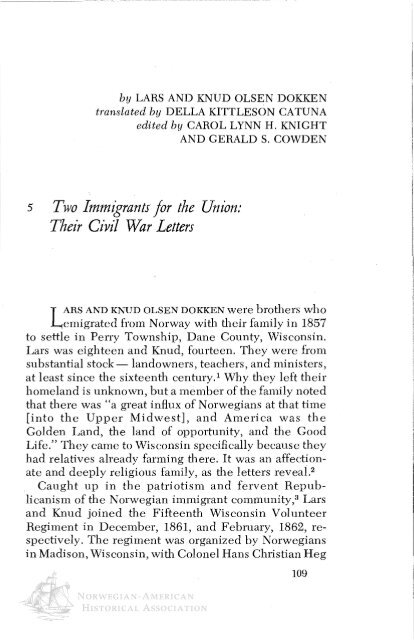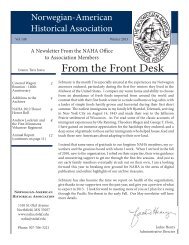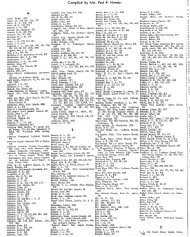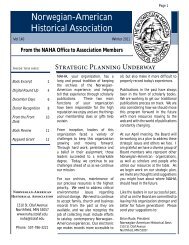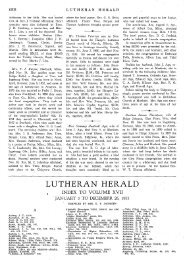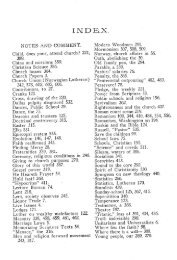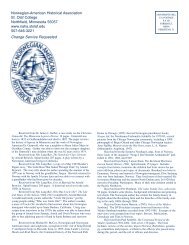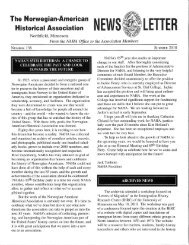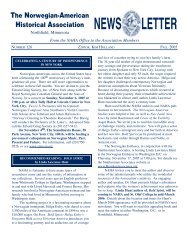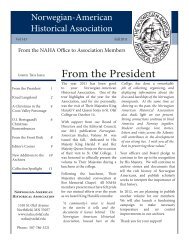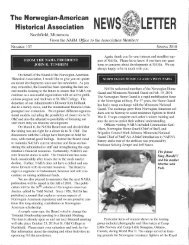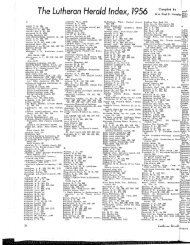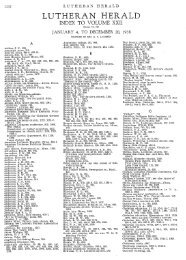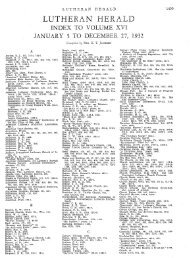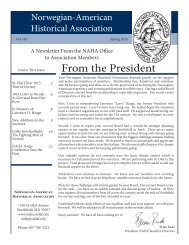Two Immigrants for the Union.' Their Civil War Letters - Norwegian ...
Two Immigrants for the Union.' Their Civil War Letters - Norwegian ...
Two Immigrants for the Union.' Their Civil War Letters - Norwegian ...
Create successful ePaper yourself
Turn your PDF publications into a flip-book with our unique Google optimized e-Paper software.
y LARS AND KNUD OLSEN DOKKEN<br />
translated by DELLA KITTLESON CA TUNA<br />
edited by CAROL LYNN H. KNIGHT<br />
AND GERALD S. COWDEN<br />
5 <strong>Two</strong> <strong>Immigrants</strong> <strong>for</strong> <strong>the</strong> <strong>Union</strong>.'<br />
<strong>Their</strong> <strong>Civil</strong> <strong>War</strong> <strong>Letters</strong><br />
LARS AND KNUD OLSEN DOKKEN were bro<strong>the</strong>rs who<br />
emigrated from Norway with <strong>the</strong>ir family in 1857<br />
to settle in Perry Township, Dane County, Wisconsin.<br />
Lars was eighteen and Knud, fourteen. They were from<br />
substantial stock- landowners, teachers, and ministers,<br />
at least since <strong>the</strong> sixteenth century.l Why <strong>the</strong>y left <strong>the</strong>ir<br />
homeland is unknown, but a member of <strong>the</strong> family noted<br />
that <strong>the</strong>re was "a great influx of <strong>Norwegian</strong>s at that time<br />
[in to <strong>the</strong> Up per Midwest], and Ame rica was <strong>the</strong><br />
Golden Land, <strong>the</strong> land of opportunity, and <strong>the</strong> Good<br />
Life." They came to Wisconsin specifically because <strong>the</strong>y<br />
had relatives already farn1ing <strong>the</strong>re. It was an affectionate<br />
and deeply religious family, as <strong>the</strong> letters reveal.2<br />
Caught up in <strong>the</strong> patriotism and fervent Republicanism<br />
of <strong>the</strong> <strong>Norwegian</strong> immigrant community, 3 Lars<br />
and Knud joined <strong>the</strong> Fifteenth Wisconsin Volunteer<br />
Regiment in December, 1861, and February, 1862, respectively.<br />
The regiment was organized by <strong>Norwegian</strong>s<br />
in Madison, Wisconsin, with Colonel Hans Christian Heg<br />
109
Lars and Knud Dokken<br />
in command. Heg, himself an immigrant and a local<br />
politician, was well suited to lead his fellow <strong>Norwegian</strong>s,<br />
about 3,500 of whom eventually joined his contingent.<br />
After training near Madison at Camp Randall, <strong>the</strong><br />
regiment moved on March l, 1862, to Chicago, where<br />
<strong>the</strong> Nora Lodge, a Scandinavian society, presented <strong>the</strong>m<br />
a flag. They <strong>the</strong>n moved on to <strong>Union</strong> City, Tennessee,<br />
which <strong>the</strong>y captured from <strong>the</strong> Confederates on March<br />
30. The next month <strong>the</strong>y helped take Island No. lO in <strong>the</strong><br />
Mississippi River, where two of <strong>the</strong>ir companies remained<br />
on garrison duty. Meanwhile, Knud died of<br />
camp fever. In October <strong>the</strong> <strong>Norwegian</strong>s moved southward.<br />
After long marches through Tennessee, Mississippi,<br />
Alabama, and Kentucky, Lars was wounded in <strong>the</strong><br />
Battle of Stone's River, Tennessee, in December, 1862.<br />
He died three months later in a <strong>Union</strong> hospital in<br />
Nashville.<br />
The Fifteenth Regiment went on, suffering heavy<br />
casualties at <strong>the</strong> Battle of Chickamauga, where Colonel<br />
Heg and many o<strong>the</strong>r officers were killed. A remnant of<br />
<strong>the</strong> unit, rein<strong>for</strong>ced by <strong>the</strong> companies who had remained<br />
at Island No. 10, followed General Sherman on his<br />
march to Atlanta. The three-year enlistment <strong>for</strong> most of<br />
<strong>the</strong> <strong>Norwegian</strong>s ended in <strong>the</strong> autumn of 1864, and <strong>the</strong>ir<br />
regiment was disbanded, having lost more than a third of<br />
its members. Of <strong>the</strong> survivors, some went home; most of<br />
<strong>the</strong> o<strong>the</strong>rs remained in service at various posts of duty.<br />
Throughout <strong>the</strong> campaigns in which <strong>the</strong> Dokken<br />
bro<strong>the</strong>rs took part, <strong>the</strong>y wrote regular letters to <strong>the</strong>ir "un<strong>for</strong>gettable<br />
parents" in Wisconsin. <strong>Their</strong> experience was<br />
that of <strong>the</strong> common soldier who followed orders and was<br />
not always certain of what was happening in <strong>the</strong> war.<br />
<strong>Their</strong> concerns were <strong>for</strong> <strong>the</strong>ir wages, <strong>the</strong>ir food, <strong>the</strong>ir<br />
clo<strong>the</strong>s, and small amenities to make <strong>the</strong>ir ordeal tolerable.<br />
What sustained <strong>the</strong>m was not only <strong>the</strong>ir belief in <strong>the</strong><br />
U ni on cause, but als o a strong and simple religious faith.<br />
llO
IMMIGRANTS FOR THE UNION<br />
The Dokken letters, after remaining in <strong>the</strong> family <strong>for</strong><br />
more than a century, were recently given to <strong>the</strong> State<br />
Historical Society of Wisconsin, which has granted us<br />
permission to use <strong>the</strong>m. Written in <strong>Norwegian</strong>, <strong>the</strong>y<br />
were published in large part by Waldemar Ager in his<br />
Oberst Heg og hans gutter (Eau Claire, Wisconsin,<br />
1916). 4 They deserve <strong>the</strong> wider audience made possible<br />
by <strong>the</strong>ir translation into English. Some editorial changes<br />
have been necessary. As all <strong>the</strong> letters were addressed to<br />
parents, bro<strong>the</strong>rs, and sisters, salutations and closing<br />
remarks have been eliminated. Material of a purely personal<br />
nature referring to family and friends has been<br />
greatly reduced. The editors are grateful to members of<br />
<strong>the</strong> Dokken family, who have anglicized <strong>the</strong>ir name to<br />
Kittleson, <strong>for</strong> <strong>the</strong>ir support of this project. In particular<br />
we thank Calvin and Ca<strong>the</strong>rine Kittleson, who first<br />
shared <strong>the</strong> letters with us and inh·oduced us to <strong>the</strong>ir<br />
aunt, Della Kittleson Catuna, our translator, collaborator,<br />
and friend.<br />
l. NO BATTLES YET<br />
Camp Lyon, Birds Point, Missouri March 8, 1862<br />
As we now have arrived, we must send a few words,<br />
dear parents, to let you know how our trip has been<br />
going. We left Madison on March 2 and came to Chicago<br />
<strong>the</strong> same evening at 7 o' clock. We were welcomed by <strong>the</strong><br />
citizens <strong>the</strong>re with cheers and applause when we<br />
marched through <strong>the</strong> city. We halted not far from <strong>the</strong><br />
station where we were to board <strong>the</strong> train. 5<br />
We were presented with a flag that <strong>the</strong> <strong>Norwegian</strong><br />
women of Chicago had designed and made <strong>for</strong> our regiment.<br />
When we had boarded <strong>the</strong> train, we were treated<br />
to coffee and cake, and at about 11 o' clock in <strong>the</strong> evening<br />
we left from <strong>the</strong>re and arrived at Alton, on <strong>the</strong> Mississippi<br />
River, Monday evening. There we boarded a<br />
steamboat which brought us to St. Louis Tuesday morn-<br />
111
Lars and Knud Dokken<br />
ing. We stayed <strong>the</strong>re until Wednesday and again got on a<br />
steamer that brought us here, a few miles from Cairo, on<br />
Thursday morning [March 6]. 6<br />
From St. Louis it was quite cold on <strong>the</strong> boat, as we had<br />
to lie on <strong>the</strong> open deck. Lars became ill, presumably<br />
with a cold. He has been laid up <strong>for</strong> 4 days, but we hope<br />
he will soon be well again. He is now in <strong>the</strong> hospital,<br />
where he is in good hands, with nursing care, doctors,<br />
and medicines. 7 O<strong>the</strong>rwise, we have it pretty good here<br />
at camp, since we have good houses or barracks to live<br />
in. Besides our regiment, <strong>the</strong>re are also a couple of o<strong>the</strong>r<br />
infantry units as well as some artillery. There are no<br />
enemies in <strong>the</strong> vicinity, though <strong>the</strong>y are close enough <strong>for</strong><br />
our outposts to take 3 Sou<strong>the</strong>rn soldiers prisoners yesterday.8<br />
We sent $35 home in a letter from Madison. Will you<br />
let us know when you receive it 9 We don't think we<br />
will take part in any battle soon, and possibly we will<br />
escape entirely. As <strong>for</strong> <strong>the</strong> South, it surely can not last<br />
very long. Also, <strong>the</strong>re are many troops here who have<br />
been in <strong>the</strong> service longer than we, and <strong>the</strong>y will be<br />
taken befare us. 10 So I will close with loving wishes from<br />
your devoted sons, Knud and Lars Olsen. We will be<br />
happy to get letters as soon as possible so that we will<br />
know if you have received <strong>the</strong> money. 11<br />
Knud Olsen Dokken<br />
2. THREE MILES FROM THE ENEMY<br />
[No address] March 18, 1862<br />
I must write a few words now to tell you that to date I<br />
find myself in good health. On <strong>the</strong> 14th we left Birds<br />
Point on a steamboat down <strong>the</strong> Mississippi. Bro<strong>the</strong>r Lars<br />
was left behind as he was sick, but I hope he will follow<br />
in a few days; he was feeling better when we left.<br />
It is now 3 days since we arrived. We are 3 miles from<br />
<strong>the</strong> enemy. Our cannonboats fire at <strong>the</strong>m every day, and<br />
112
IMMIGRANTS FOR THE UNION<br />
<strong>the</strong>y fire back at us. So we are not safe at any time. We<br />
think we will attack when we are all assembled. We<br />
don't knowhow many [Rebels] <strong>the</strong>re are, but <strong>the</strong>re seem<br />
to be a great number. They are on an island [Island No.<br />
10], which is surrounded by our troops. Of our men,<br />
<strong>the</strong>re were 5 killed and 4 wounded. How many <strong>the</strong><br />
enemy lost, we don't know. We land troops have not<br />
fired a shot as yet. Whe<strong>the</strong>r we see one ano<strong>the</strong>r again we<br />
do not know. That remains in <strong>the</strong> Lord's almighty hand.<br />
He guides us on our way. 12<br />
Knud Olsen Dokken<br />
3. I HAVE BEEN VERY ILL<br />
Camp Lyon, Birds Point, Missouri March 26, 1862<br />
As I have a few moments now, I must greet you with a<br />
few lines to let you know how I am getting along down<br />
here. Since I came to this place I have been very ill, but<br />
now, with God's help, I am improving. I hope that in a<br />
short while I will be well again.<br />
Our regiment got marching orders to leave on March<br />
13 to New Madrid, which is about 40 miles away down<br />
<strong>the</strong> Mississippi. Those who were well left, as did my<br />
bro<strong>the</strong>r Knud. Those who were sick, along with a few<br />
o<strong>the</strong>rs of <strong>the</strong> regiment, remained here at Birds Point; I<br />
believe <strong>the</strong>re were over 100 men, same from each company.<br />
The regiment is now in 3 places. We don't know<br />
when we will follow <strong>the</strong>m. Perhaps it will be a long time<br />
befare we reassemble again. But I don't think we are in<br />
any danger from <strong>the</strong> enemy so long as we are here. Many<br />
became sick soon after <strong>the</strong>y arrived, due, I think, to <strong>the</strong><br />
unfamiliar climate and <strong>the</strong> dirty Mississippi water that<br />
we have to use. New Madrid was deserted by <strong>the</strong> enemy<br />
<strong>the</strong> same morning our regiment arrived, and our men did<br />
not take part in any battle. They are lodged in <strong>the</strong> same<br />
boat that brought <strong>the</strong>m down tl
Lars and Knud Dokken<br />
From my bro<strong>the</strong>r I have not heard since he left.<br />
There is an island in <strong>the</strong> Mississippi called Island No.<br />
10, which is stoutly held by <strong>the</strong> Rebels and which <strong>the</strong><br />
North has tried to capture with <strong>the</strong>ir cannonboats, but it<br />
is so strongly <strong>for</strong>tified <strong>the</strong>y have not been able to take it.<br />
It lies a ways down from New Madrid. They cannot use<br />
land troops, <strong>the</strong>re<strong>for</strong>e not aur regiment. 13<br />
Y o ur laving son,<br />
Lars Olsen Dokken<br />
4. WE TAKE ISLAND NO. 10<br />
[The tap part of this letter is missing; <strong>the</strong> date is apparently<br />
April 18, 1862.]<br />
On April 2, I again joined my regiment, which was<br />
encamped far<strong>the</strong>r down <strong>the</strong> Mississippi River. There I<br />
met my bro<strong>the</strong>r who is full of vigor and in good health in<br />
all respects.<br />
We see by your letter that you received <strong>the</strong> $35 we<br />
sent from Madison and that you paid back <strong>the</strong> person<br />
whom we owed. But we don't know when we will get<br />
our pay. Surely, as soon as we receive it, we will send<br />
same home. We should have it on May first, but it is not<br />
certain. Certainly we should get it at regular periods. 14<br />
And now I must tell you about an engagement we had<br />
on March 31. We were about 500 men from our regiment<br />
and 7 companies of <strong>the</strong> 27th Illinois Regiment, a company<br />
of cavalry, and one of artillery. So we were about<br />
1,400 men. We left our camp on <strong>the</strong> 30th and marched<br />
part of <strong>the</strong> way that day. That night we encamped in a<br />
grain field. The next morning we were out early and<br />
reached <strong>the</strong> enemy camp when <strong>the</strong>y were about to have<br />
breakfast. Our cavalry and artillery began fire, which<br />
surprised <strong>the</strong>m so that <strong>the</strong>y took flight like bewildered<br />
sheep. They left everything behind, guns and clothing<br />
and many o<strong>the</strong>r things. But <strong>the</strong> enemy was pretty strong;<br />
we believe about 3,000 or 4,000 .... [Tap ofl.etter page<br />
miss ing.]<br />
114
IMMIGRANTS FOR THE UNION<br />
And now Island No. 10 is captured with 5 or 6,000 men<br />
taken prisoners. It was taken on April 6. There was no<br />
battle; bordes of our troops merely came up from behind,<br />
and <strong>the</strong> enemy gave <strong>the</strong>mselves up quickly. Our cannonboats<br />
bad lain <strong>the</strong>re about 3 weeks and bad fired at<br />
<strong>the</strong>ir batteries. We did no damage to <strong>the</strong>ir batteries until<br />
our troops came up behind. Our regiment arrived on <strong>the</strong><br />
island on April 8. Five companies are now on <strong>the</strong> island<br />
and 5 are on <strong>the</strong> o<strong>the</strong>r side of <strong>the</strong> Mississippi River. They<br />
are Cos. C, D, C, E, and B. They stand guard and do<br />
miscellaneous work, cleaning up after <strong>the</strong> Rebels. The<br />
companies on <strong>the</strong> island are doing <strong>the</strong> same. We are<br />
streng<strong>the</strong>ning <strong>the</strong> batteries <strong>for</strong> a possible future breakthrough<br />
by <strong>the</strong> Sou<strong>the</strong>rners. All around us are many can-·<br />
nonboats and all kinds of ammunition which <strong>the</strong> Rebels<br />
had to leave behind when <strong>the</strong>y were taken prisoners. We<br />
think we will remain here <strong>for</strong> same time, <strong>for</strong> <strong>the</strong> general<br />
has said <strong>the</strong>re is little indication of our going into battle.<br />
But we may do guard du ty at same place or o<strong>the</strong>r. As <strong>for</strong><br />
<strong>the</strong> war itself, we know nothing. I believe you hear much<br />
more than we do. We only know what happens here<br />
around us. You receive Endgranten 15 befare we<br />
do. . . . [Half of a letter page missing.]<br />
I must tell you that <strong>the</strong> woods are in fullleaf and <strong>the</strong><br />
fields and meadows are filled with flowers. The wea<strong>the</strong>r<br />
is quite warm. We are afraid it will be very hot here this<br />
summer. Please write to us as soon as possible so we can<br />
hear about this and that in <strong>the</strong> neighborhood .... [Torn<br />
letter page.]<br />
Lars Olsen Dokken<br />
5. FORTIFYING THE ISLAND<br />
Island No. 10, Tennessee May 4, 1862<br />
I am sony to have to tell you that bro<strong>the</strong>r Knud has<br />
been ill <strong>for</strong> same time of typhoid fever and has been<br />
bedridden <strong>for</strong> over a week. But I am, praise God, well<br />
<strong>the</strong>se days, <strong>for</strong> which I thank <strong>the</strong> Lord. We hope to hear<br />
115
Lars and Knud Dokken<br />
<strong>the</strong> same from you, that you are all in good health. There<br />
are man y sick of nerve fever in our regiment. Some died<br />
last week. There are so many sick here. Let us hope <strong>the</strong><br />
Lord will heal all <strong>the</strong> sick and grieving people in this<br />
enemy land. For all of us, it is <strong>the</strong> greatest wish to tell<br />
you that we are in sound health. O<strong>the</strong>r friends and relatives<br />
are well, and <strong>the</strong>y ask us to send <strong>the</strong>ir greetings.<br />
We are still working on <strong>the</strong> <strong>for</strong>tifications and will soon<br />
be finished with <strong>the</strong> trenches. They are six feet deep on<br />
one side and a good 10 to 12 feet on <strong>the</strong> o<strong>the</strong>r, and filled<br />
with dirt. On <strong>the</strong> inside of <strong>the</strong> battery is a wooden fence<br />
6 feet high, put up so that <strong>the</strong> earth does not slide down<br />
on <strong>the</strong> cannon that will be placed <strong>the</strong>re. We have set up 4<br />
cannon but <strong>the</strong>re will be about 50 in all. The <strong>for</strong>tification<br />
lies straight across <strong>the</strong> island. It will be <strong>the</strong> best place to<br />
blockade <strong>the</strong> Mississippi River. Every boat that comes<br />
up <strong>the</strong> river has to give a signal, or we fire upon <strong>the</strong>m<br />
with our new cannon. Regarding <strong>the</strong> war, I have no<br />
news, though we have heard that New Orleans has been<br />
seized and man y of <strong>the</strong> South' s gunboats. Some of <strong>the</strong>m<br />
escaped up <strong>the</strong> river, and <strong>the</strong>se we fear will try to take<br />
our boats, now lying about 30 miles down <strong>the</strong> river.<br />
There<strong>for</strong>e, we are hurrying toget our <strong>for</strong>ts ready, in case<br />
that should happen. However, <strong>the</strong>y say it is not certain<br />
<strong>the</strong>y will attempt to come up <strong>the</strong> river again as <strong>the</strong>re are<br />
bulwarks on all sides. 16 As <strong>for</strong> our pay, we have not received<br />
any, but as soon as we do, we will send home as<br />
much as we can.<br />
Lars Olsen Dokken<br />
6. A DISORDERLY CELEBRATION<br />
Island No. 10 June 4, 1862<br />
Since I now have a moment's leisure, I really must<br />
take pen in hand to let you know how I am getting along<br />
<strong>the</strong>se days. Since I recovered from my illness, I have<br />
been in pretty good health, <strong>for</strong> which I thank God.<br />
116
IMMIGRANTS FOR THE UNION<br />
There are many sick in our regiment and <strong>the</strong>y are in<br />
<strong>the</strong> hospital. Five men from our company have died<br />
since we came to Island No. 10, and now <strong>the</strong>re are 6 of<br />
<strong>the</strong>m in <strong>the</strong> hospital, and also about 10 men are still<br />
unable to work. Our company, along with Co. K, moved<br />
from <strong>the</strong> island on May 19 to <strong>the</strong> o<strong>the</strong>r side of <strong>the</strong> Mississippi<br />
River. We are about one mile from <strong>the</strong> o<strong>the</strong>r companies<br />
that have remained here. We are inside a <strong>for</strong>t,<br />
which has deep trenches on all sides; so we cannot go<br />
out or come in without a pass from aur captain. There is<br />
one gate with a bridge over it, which is guarded day and<br />
night. The <strong>for</strong>t is in a square, about 20 rods on each side.<br />
Since we came here, we have had to stand guard every<br />
o<strong>the</strong>r day, as <strong>the</strong>re are so many gates to watch. So we<br />
who are well and able have a lot to do. It is pretty rough,<br />
because we do not get enough sleep. Although we can<br />
rest on our day off, <strong>the</strong>re is still plenty work to do, such<br />
as polishing our guns and o<strong>the</strong>r things. In <strong>the</strong> morning<br />
befare we go on duty, our captain comes to see us. We<br />
now have a new captain named George Wilson from<br />
Madison. He is a very nice fellow. Our <strong>for</strong>mer captain<br />
~as disqualified and sent home. Also, our Colonel Heg<br />
returned this evening after a short trip to Madison,<br />
which you may have heard about.l 7 And I must tell you<br />
that on May 26 we got new uni<strong>for</strong>ms, which are very<br />
good looking. We got black hats decorated with a bugle<br />
and an eagle and a black fea<strong>the</strong>r set on <strong>the</strong> side. Also<br />
black frock coats, black trousers of <strong>the</strong> same material,<br />
and white woolen undershirts and shoes; all of this we<br />
got new.l 8 But we have not received our pay, and we do<br />
not know when we will get it ei<strong>the</strong>r, perhaps not until<br />
Jul y.<br />
I must also tell you that our officers voted to give us<br />
<strong>the</strong> 17th of May [<strong>Norwegian</strong> Constitution Day] as a holiday,<br />
so our regiment could have a little fun. Our company<br />
got same be er which we sent to Cairo <strong>for</strong>. But same<br />
117
Lars and Knud Dokken<br />
of <strong>the</strong> men in Co. A got quite drunk and rowdy and<br />
started a fight. They were put in <strong>the</strong> guardhouse. But<br />
several of <strong>the</strong>ir friends set out <strong>for</strong> <strong>the</strong> guardhouse,<br />
shoved <strong>the</strong> guard out of <strong>the</strong> way, and freed <strong>the</strong> prisoners.<br />
But <strong>the</strong>n our captain, who was officer of <strong>the</strong> da y, arrived<br />
and he tried toget <strong>the</strong>se fellows under control. But <strong>the</strong>re<br />
was one chap who struck at our captain, and <strong>the</strong> whole<br />
company went wild. Then emne an order that our 4 companies<br />
should bring <strong>the</strong>m to order. The command "Fall<br />
in, fall in" was called out, and so we assembled as<br />
quickly as possible. We were told to load our guns<br />
quickly and were marched to <strong>the</strong> guardhouse in <strong>for</strong>mation.<br />
Company A was lined up and we ringed <strong>the</strong>m in.<br />
The major came to question <strong>the</strong>m. All of <strong>the</strong>m had to turn<br />
in <strong>the</strong>ir guns to <strong>the</strong> major and 6 of <strong>the</strong> men were put<br />
under arrest. <strong>Their</strong> lieutenant was also arrested. They<br />
have not yet been sentenced and so we don't know what<br />
will happen. I am afraid it will go hard with <strong>the</strong>m.<br />
Ano<strong>the</strong>r man of our company is under arrest <strong>for</strong>falling<br />
asleep at his post while standing guard. He is Ole Olsen<br />
Neregjorde. 19 He has not come to trial yet, but I know it<br />
will be hard, <strong>for</strong> <strong>the</strong>re is a death sentence <strong>for</strong> those who<br />
sleep at <strong>the</strong> post. Ano<strong>the</strong>r man was punished because he<br />
refused to tidy up his tent. He was hanged by <strong>the</strong> hands<br />
as long as <strong>the</strong>y thought he could stand it. So you have to<br />
obey your officers - or else! 20<br />
As <strong>for</strong> <strong>the</strong> war, we don't know anything new except<br />
that <strong>the</strong> Rebels have deserted Corinth 21 and I have<br />
heard that MacClelland [sic] has begun to bombard<br />
Richmond, which I believe has been taken. But I also<br />
heard that <strong>the</strong>y have begun to recruit men again in <strong>the</strong><br />
North to replenish <strong>the</strong> regiments. I don't see how that<br />
can be true, because I thought <strong>the</strong>re would soon be an<br />
end to this war, and that we could come home. But it<br />
does not look like it, if <strong>the</strong>y are enlisting more men. We<br />
must hope that we can come home soon.<br />
118
IMMIGRANTS FOR THE UNION<br />
Regarding my bro<strong>the</strong>r' s death, I believe you have received<br />
my last letter stating that he passed away on May<br />
7. He was in a clear state of mind until he drew his last<br />
breath. But it was sad <strong>for</strong> me to be parted from him in<br />
this enemy land, but <strong>the</strong> Lord does all <strong>for</strong> <strong>the</strong> best. He<br />
knew what was best <strong>for</strong> him, that he no langer had to<br />
struggle in this evil world. So we hope that he has it<br />
better than we do, we poor weak sinners. May God help<br />
and guide us on <strong>the</strong> right path and may He shield us all<br />
from sudden and abrupt death, which can come quickly<br />
upon us poor sinners.<br />
As <strong>for</strong> my bro<strong>the</strong>r's clo<strong>the</strong>s, I will try to have <strong>the</strong>m sent<br />
home, but I am afraid it will east very much. I think our<br />
captain will have an opportunity to send <strong>the</strong>m. I don' t<br />
know just how to get his pay, but I believe our captain<br />
will check on this and see that it will be sent to you at<br />
home. I, myself, can do nothing about it. As soon as I<br />
receive my pay I will send same home.<br />
Lars Olsen Dokken<br />
7. THE DEATH OF A BROTHER<br />
Island No. 10, Tennessee June 11, 1862<br />
I see that you got <strong>the</strong> news of <strong>the</strong> death of my bro<strong>the</strong>r<br />
Knud, which was a great sorrow <strong>for</strong> you. But we have to<br />
accept it and let <strong>the</strong> Lord' s will be done. You asked me to<br />
tell you a little more about his last moments. He was<br />
quite resigned to his fate, except that he wished that he<br />
could speak to you again, but it was not <strong>the</strong> Lord's will<br />
that he should come home. He prayed that <strong>the</strong> Lord<br />
would be merciful to him. I read to him quite aften,<br />
which pleased him. He was cairn and at peace to <strong>the</strong> last.<br />
He was resigned to God' s will and prayed that we could<br />
all meet again with our Lord and Saviour Jesus Christ.<br />
We have also received marching orders to go up <strong>the</strong><br />
river to Kentucky, and so we are standing ready to march<br />
to <strong>the</strong> boat that will take us up <strong>the</strong> Mississippi. We do not<br />
119
Lars and Knud Dokken<br />
know where we are going, but as soon as we stop, I will<br />
write to you. I must tell you also that <strong>the</strong> river has been<br />
clem·ed of Rebels way down to New Orleans; so boats<br />
can now come up with all sorts of Re bel goods, clear to<br />
Cairo, Illinois.<br />
Lars Olsen Dokken<br />
8. WE REBUILD RAILROAD BRIDGES<br />
<strong>Union</strong> City, Tennessee June 18, 1862<br />
We finally left Island No. 10 <strong>the</strong> evening of June 11<br />
and arrived at Hickman at 7 o' clock <strong>the</strong> next morning.<br />
We stayed <strong>the</strong>re till noon, <strong>the</strong>n marched about 12 miles<br />
and lay over in a field overnight. The next morning we<br />
were off again and came to <strong>Union</strong> City at 11 a.m. We set<br />
up aur tents and have been here since. We guard a railroad<br />
and are working to rebuild same bridges that <strong>the</strong><br />
Rebels had burned at several places. We have repaired a<br />
railroad crossing, which is now ready <strong>for</strong> use. No trains<br />
have been able to run since <strong>the</strong> Rebels were driven off<br />
this spring, when we were here and burned all <strong>the</strong>ir<br />
tents and <strong>the</strong> town. The town is almost deserted and all<br />
<strong>the</strong> houses stand vacant. 22<br />
Now we have received marching orders to leave here<br />
tomorrow at 5 a.m., to mave ahead <strong>for</strong> more railroad work<br />
and repair. I think all <strong>the</strong> regiments will be toge<strong>the</strong>r as<br />
we are under <strong>the</strong> same general.2 3 I don't knowhow far<br />
<strong>for</strong>ward we will go.<br />
Lars Olsen Dokken<br />
9. NO CHANCE FOR LEA VE<br />
Humboldt, Tennessee July 3, 1862<br />
The next morning we set out again and marched to<br />
Humboldt, where we now have aur camp in an apple<br />
orchard, which is very pleasant. There are many troops<br />
around this town. The Rebels find us in all parts of <strong>the</strong><br />
state. Much damage is done to <strong>the</strong> farms as <strong>the</strong> <strong>Union</strong><br />
120
IMMIGRANTS FOR THE UNION<br />
troops advance, especially when <strong>the</strong>y find a Rebelowned<br />
farm. Many of <strong>the</strong> farmers have come into town<br />
and swear loyalty to <strong>the</strong> <strong>Union</strong>, as <strong>the</strong>y dare do nothing<br />
else. Those who do not join up are put under arrest. I<br />
stood watch at a house here <strong>the</strong> o<strong>the</strong>r night where <strong>the</strong>y<br />
had six of those men and I saw one whose hands were<br />
ti ed. Our troops scout <strong>the</strong> countryside <strong>for</strong> <strong>the</strong>m and bring<br />
<strong>the</strong>m into town, where <strong>the</strong>y are questioned by our<br />
officers. 24<br />
How long we will be here we do not know. We have<br />
received no pay and we don't know when we get it<br />
ei<strong>the</strong>r. Things look pretty grim, but as soon as it emnes, I<br />
will send some home to you, as I know you are waiting<br />
<strong>for</strong> money fromme. It is over four months since we were<br />
paid.<br />
By your letter I see that you have spoken to a man from<br />
our regiment who was home on a short leave. You wish<br />
that I, also, could come home, but that is impossible<br />
when I have no money. Besides, I think that those who<br />
are well cannot get leave, only those who are sickly or<br />
have been ill. I certainly wish I could come but it is hard<br />
toget away now.<br />
Lars Olsen Dokken<br />
10. WE SCROUNGE FOR BETTER RATIONS<br />
Camp luka, Mississippi August 18, 1862<br />
Every day I hope <strong>for</strong> a letter, as I want to know how<br />
you are getting along in Wisconsin this summer. I have<br />
heard through o<strong>the</strong>rs that it was a poor year <strong>for</strong> wheat.<br />
Also, I would like to hear about <strong>the</strong> recruiting in <strong>the</strong><br />
state, whe<strong>the</strong>r <strong>the</strong>y are getting enough volunteers, or<br />
have <strong>the</strong>y begun to draft in order toget enough men It<br />
certainly is hoped that more troops will come in quickly<br />
so that <strong>the</strong>re will be an end to this war.<br />
The last time we moved was to a small town about 18<br />
or 19 miles on. It is on <strong>the</strong> railroad line from Corinth<br />
121
Lars and Knud Dokken<br />
[Mississippi] to Alabama and is named luka. We are not<br />
far from <strong>the</strong> state line between Alabama and Mississippi.<br />
I have heard that we will go far<strong>the</strong>r toward <strong>the</strong> Sou<strong>the</strong>ast,<br />
but just where we are headed we don't know. We<br />
have not seen any Re bel troops yet, but <strong>the</strong>y say <strong>the</strong>y are<br />
in flight southward as fast as <strong>the</strong>y can go.<br />
I must tell you about an order that was announced at<br />
dress parade one day. We should scout around <strong>the</strong> country<br />
and round up all <strong>the</strong> Negroes we could find and we<br />
could <strong>the</strong>n place one Negro <strong>for</strong> every eight men to cook<br />
and wash <strong>for</strong> us and to do clean-up duty around <strong>the</strong><br />
camp. We have not found any yet. But our regiment has<br />
quite a few [Blacks] who are cooks <strong>for</strong> <strong>the</strong> officers, and<br />
<strong>the</strong>re are some in o<strong>the</strong>r companies. 25 We also go around<br />
<strong>the</strong> country ga<strong>the</strong>ring corn and apples, as much as we can<br />
use every day, and also chickens and o<strong>the</strong>r things that<br />
<strong>the</strong> soldiers like to eat. Many farmers have deserted <strong>the</strong><br />
land. They are in a sad state in many places, because<br />
when <strong>the</strong> soldiers find that <strong>the</strong> owner is a Re bel, <strong>the</strong>y take<br />
all he has. Also he loses his Negroes, who are set free.<br />
They now work <strong>for</strong> <strong>the</strong> regiments at a salary of $8 to $10 a<br />
month.<br />
Lars Olsen Dokken.<br />
ll. WANDERING THROUGH THE SOUTH<br />
Nashville, Tennessee September 5, 1862<br />
Now I must tell you about our wanderings through <strong>the</strong><br />
land. We have covered about 180 miles since we left<br />
luka on August 21. We left shortly after noon that day<br />
and marched to <strong>the</strong> Tennessee River to a small town<br />
named Eastport. We crossed <strong>the</strong> river with all our gear<br />
on a steamer- both <strong>the</strong> First and Second Brigades- so<br />
we were not ready to leave <strong>the</strong>re until <strong>the</strong> afternoon of<br />
<strong>the</strong> 23rd. On <strong>the</strong> 24th we arrived at Florence, Alabama,<br />
where we lay over <strong>for</strong> one day. On <strong>the</strong> 26th we marched<br />
122
IMMIGRANTS FOR THE UNION<br />
again about 18 miles, and on <strong>the</strong> 27th arrived at Lawrenceburg,<br />
Tennessee. On <strong>the</strong> 28th we came to a small<br />
village called Mt. Pleasant, and on <strong>the</strong> 29th we arrived at<br />
Columbia. On <strong>the</strong> 30th we marched about 25 miles and<br />
lay over in same woods. On <strong>the</strong> 31st we marched to a<br />
town named Franklin and, when we stopped in <strong>the</strong> afternoon,<br />
we were mustered <strong>for</strong> review. On September l<br />
we marched to Murfreesboro, where we set up camp<br />
dose to <strong>the</strong> town. We were on guard duty through <strong>the</strong><br />
night, and in <strong>the</strong> evening of <strong>the</strong> 3rd we set out again on<br />
<strong>the</strong> road to Nashville, marching until midnight. We<br />
rested a while but set off again earl y in <strong>the</strong> morning and<br />
marched 15 miles to where we are now camped, about 3<br />
miles from <strong>the</strong> city of Nashville. The whole army is<br />
camped here in <strong>the</strong> woods.<br />
As <strong>for</strong> our food and victuals, <strong>the</strong>y have been very poor;<br />
we have got nothing but bacon and crackers on <strong>the</strong> way.<br />
Sometimes we get a little coffee but most aften not. It is<br />
pretty hard to hold up like a man on such poor fare, with<br />
so much marching. Milk we hardly ever see. Now and<br />
<strong>the</strong>n along <strong>the</strong> way we may be able to buy a canteenful,<br />
which is a pint, but it costs 15 or 20 cents. It is very<br />
difficult to visit <strong>the</strong> farms, <strong>for</strong> whenever we stop to camp<br />
<strong>for</strong> a day, guards are placed around <strong>the</strong> camps and <strong>the</strong><br />
farms, even if <strong>the</strong> owner is in <strong>the</strong> Sou<strong>the</strong>rn army. We<br />
have never seen such rambling anwng <strong>the</strong> Rebel states<br />
as we have here. If <strong>the</strong>y [<strong>Union</strong> officers] don't change<br />
<strong>the</strong>ir campaign and get ahead any faster, this war will<br />
never be over. 26<br />
We have heard that <strong>the</strong> Rebels have advanced far into<br />
Tennessee and Kentucky. So it seems this war is going<br />
no better than when it started. I hear we are going to<br />
retreat even far<strong>the</strong>r here in Tennessee. There are<br />
guerilla bands all over <strong>the</strong> state that elude capture.<br />
Lars Olsen Dokken<br />
123
Lars and Knud Dokken<br />
12. SERIOUS FIGHTING AT GREEN RIVER<br />
Louisville, Kentucky September 28, 1862<br />
As I now have a little time to spare, I will take pen in<br />
hand and send you a few lines to let you know that we<br />
have just arrived in this city and that I am) praise God, in<br />
good health to date, <strong>for</strong> which I thank <strong>the</strong> Lord. But we<br />
are extremely exhausted from <strong>the</strong> long marches we have<br />
had <strong>for</strong> over a month. We have marched about 400 miles<br />
since August 21, when we left luka, Mississippi. We<br />
marched to Florence, Alabama, <strong>the</strong>n to Columbia, Tennessee,<br />
from <strong>the</strong>re to Franklin, to Murfreesboro, <strong>the</strong>n to<br />
Nashville, where we stayed 5 days. On September 11 we<br />
left <strong>the</strong>re and went to Bowling Green, Kentucky.<br />
From <strong>the</strong>re on <strong>the</strong> way to Louisville we met up with<br />
<strong>the</strong> enemy who lay by Green River. We came in combat<br />
<strong>the</strong>re on September 14. The Sou<strong>the</strong>rn troops took about<br />
4,000 of our men prisoners. We <strong>the</strong>n camped about 12<br />
miles from <strong>the</strong> enemy and stayed <strong>the</strong>re two days. While<br />
we were laid up <strong>the</strong>re, <strong>the</strong> enemy had time to withdraw,<br />
but befare <strong>the</strong>y left, <strong>the</strong>y burned a railroad bridge behind<br />
<strong>the</strong>m; this cut off <strong>the</strong> mail raute between our troops<br />
and Louisville. So we have nei<strong>the</strong>r received mail nor<br />
been able to send any home.<br />
Since luka, we have marched on <strong>the</strong> heels of <strong>the</strong><br />
enemy. They retreated toward Louisville and we after<br />
<strong>the</strong>m. About 15 miles from that city, <strong>the</strong>y took ano<strong>the</strong>r<br />
raute to avoid our troops. Many of our men have followed<br />
<strong>the</strong>m- about four divisions, I think. As <strong>for</strong> our<br />
rations, <strong>the</strong>y are very poor. We have not received more<br />
than half-rations and that has been scanty. We have gotten<br />
some flour instead of crackers; so as soon as we have<br />
stopped we begin to make pancakes, as <strong>the</strong>re is no o<strong>the</strong>r<br />
way to use it. We butcher some animals which we cook<br />
and eat as fast as we can. We get a little cured ham<br />
sometimes, but not aften. We hope things will be better<br />
from now on, as we have gotten full rations since we<br />
arrived. . . . But <strong>the</strong>y say that our supply wagons were<br />
124
IMMIGRANTS FOR THE UNION<br />
captured by <strong>the</strong> Rebels and were burned and many of<br />
our regiment left behind. If that is true, <strong>the</strong>y must be<br />
prisoners. Our knapsacks and clo<strong>the</strong>s would also be<br />
lost, and we would have to buy new clothing again.<br />
So far as <strong>the</strong> war goes, I know nothing new. But it<br />
seems like it will be a long time be<strong>for</strong>e we can come<br />
home again. As long as we can hold on to life and good<br />
health, we still have hope of seeing each o<strong>the</strong>r again. I<br />
do so wish I could be home, if only <strong>for</strong> a short while. I am<br />
so terribly tired of <strong>the</strong>se long marches. I long <strong>for</strong> a little<br />
peace and quiet, if only <strong>for</strong> a little while. But I am afraid<br />
we must be off again- where, I don't know.<br />
Lars Olsen Dokken<br />
13. UNSCATHED IN FIERCE BATTLE<br />
Perryville, Kentucky October 10, 1862<br />
In this moment of leisure I must take pen in hand and<br />
write you a few simple lines to let you know that I am<br />
well, <strong>for</strong> which I thank God. I was glad to have <strong>the</strong> same<br />
news from you in your letter of September 3 and also in<br />
one from A. Sanderson of September 12, that you are all<br />
in good health at <strong>the</strong> present time. These letters arrived<br />
on September 29, in Louisville. I read <strong>the</strong>m with great<br />
joy; especially was I glad to hear that <strong>the</strong> money I sent<br />
had arrived safely. I see that you have sent many letters<br />
to me that I have never received. I hope <strong>the</strong>y will reach<br />
me yet.<br />
I sent a letter to you from Louisville in which I told<br />
you about <strong>the</strong> long marches we had after <strong>the</strong> Rebels. We<br />
did not stay long in Louisville. On October l we were<br />
ready to decamp again. We marched <strong>for</strong> 7 days, following<br />
<strong>the</strong> Rebels, <strong>the</strong>n made bivouac about 6 miles from Perryville,<br />
which lies about 60 or 70 miles sou<strong>the</strong>ast of<br />
Louisville. We marched through <strong>the</strong> towns of Mount<br />
Washington, Bardstown, and Springfield, <strong>the</strong>n to a small<br />
town where we engaged in combat. 27<br />
It began shortly after noon on October 7. It was a fierce<br />
125
Lars and Knud Dokken<br />
battle all that day and far into <strong>the</strong> night. The next morning<br />
we started in again as fast as we could. Our division<br />
and several of our troops were held back as reserves.<br />
About 3 p.m. our brigade and division began to drive<br />
<strong>for</strong>ward and we fought as hard as we could. We attacked<br />
<strong>the</strong> enemy's right wing and <strong>the</strong> 2nd Minnesota Battery<br />
began to fire upon <strong>the</strong>m. The enemy fired back. We were<br />
ordered to lie low in a small depression, and so <strong>the</strong> hullets<br />
from both sides flew over us. This went on <strong>for</strong> an<br />
hour. Then <strong>the</strong> Rebels began a fast retreat, with us in<br />
pursuit. We took 150 prisoners, Il ammunition wagons,<br />
with powder and hullets <strong>for</strong> cannon - all taken by aur<br />
brigade from <strong>the</strong> right wing of <strong>the</strong> enemy line.<br />
In <strong>the</strong> central and left wings <strong>the</strong> battle was fierce that<br />
day, but our troops drove <strong>the</strong> enemy back. They retreated<br />
as fast as <strong>the</strong>y could, and as soon as it became<br />
dark, everything was still. At 3 a.m. we were roused and<br />
assembled in fighting lines and marched <strong>for</strong>ward. But<br />
we saw nothing of <strong>the</strong> enemy. When we found that <strong>the</strong>y<br />
had moved away from <strong>the</strong>re, we were ordered back to<br />
our camp, where we are now. It is near a Confederate<br />
hospital. There are many Rebels wounded and dead.<br />
Today, October 10, our men are burying <strong>the</strong> Re bel dead.<br />
Many are lying in <strong>the</strong> nearby woods and it is a gruesome<br />
sight to see. We have not heard exactly how many are<br />
dead and wounded on our side, but <strong>the</strong>y say many have<br />
fallen on both sides. Our regiment escaped unsca<strong>the</strong>d.<br />
We must thank God whose hand was over us and protected<br />
us from <strong>the</strong> hullets. It is terrible to see so many<br />
dead and wounded.<br />
However, <strong>the</strong>y say <strong>the</strong> enemy is not more than ten<br />
miles from here and we stand ready any minute to go<br />
after <strong>the</strong>m. I cannot tell you more than that. . . . Our<br />
regiment has decreased greatly in size. In our company<br />
<strong>the</strong>re are only 39 men left. Many are sick and have been<br />
left behind here and <strong>the</strong>re, same in every town we have<br />
126
IMMIGRANTS FOR THE UNION<br />
passed through. We have heard that some Sou<strong>the</strong>rners<br />
from around here have enlisted in our army.<br />
Lars Olsen Dokken<br />
14. COLDER WEATHER- AND NO TENTS<br />
Crab Orchard, Kentucky October 19, 1862<br />
We left <strong>the</strong> battlefield [near Perryville] on October 11<br />
and marched <strong>for</strong>ward after <strong>the</strong> enemy again. We went<br />
back and <strong>for</strong>th and all through some woods hunting <strong>for</strong><br />
<strong>the</strong>m. We came to a small town named Danville, <strong>the</strong>n to<br />
ano<strong>the</strong>r place called Lancaster, where we met some of<br />
<strong>the</strong> enemy, and <strong>the</strong>re we had a little skirmish. We<br />
began to fire upon <strong>the</strong>m, and <strong>the</strong>y made a fast retreat. So<br />
we bivouacked in a deep valley until morning and got<br />
ready to take after <strong>the</strong>m. But <strong>the</strong>re was no trace of <strong>the</strong>m,<br />
as <strong>the</strong>y had left. Then our whole division marched <strong>for</strong>ward<br />
in a line through <strong>the</strong> town. We raised <strong>the</strong> <strong>Union</strong><br />
flag and rested <strong>for</strong> a while, until we could find out where<br />
<strong>the</strong> enemy had gone. We <strong>the</strong>n marched on to <strong>the</strong> little<br />
town where we have been encamped since October 16.<br />
Our brigade is about a mile from <strong>the</strong> town. Our regiment<br />
got orders to stand patrol guard in <strong>the</strong> town and surrounding<br />
area. Yesterday our company stood guard, and<br />
I was placed in front of a large house that had once been<br />
a tavern, now partly destroyed. Some old people lived<br />
<strong>the</strong>re. There are several such places that we must guard.<br />
We have about 100 Rebel prisoners to guard also. We<br />
think <strong>the</strong> enemy is about 20 miles from here and we are<br />
waiting <strong>for</strong> orders to march to Cumberland Gap.<br />
I don't knowhow soon we willleave, but we must be<br />
prepared at any moment. As <strong>for</strong> <strong>the</strong> battle at Perryville<br />
and Chaplin Hills, I believe you have read more about it<br />
in <strong>the</strong> newspapers than I can tell you. I have no more<br />
news to relate at this time. I do wish I could be home, if<br />
only <strong>for</strong> a short while. Now it is beginning toget colder<br />
and colder at night, and to lie under <strong>the</strong> open sky can be<br />
127
Lars and Knud Dokken<br />
pretty rough. We have had no tents to sleep in since we<br />
left luka, and we have had a lot of rain and cold wea<strong>the</strong>r<br />
on our marches. Nei<strong>the</strong>r do we have any more clothing<br />
than that we are wearing and one wool blanket, which<br />
we carry with us. Our o<strong>the</strong>r clo<strong>the</strong>s and knapsacks were<br />
to be sent to Louisville, but we don't know when <strong>the</strong>y<br />
will reach us.<br />
Lars Olsen Dokken<br />
15. NO PAY FOR FOUR MONTHS<br />
Bowling Green, Kentucky November 3, 1862<br />
I will now take <strong>the</strong> opportunity to write you a few<br />
simple lines to let you know that we have returned to <strong>the</strong><br />
same town we left on September 17. We arrived here on<br />
November l. We left Crab Orchard on October 20 and<br />
marched to Lancaster, from <strong>the</strong>re to Danville. We<br />
camped <strong>for</strong> a couple of days near a small town called<br />
Lebanon. On <strong>the</strong> night of <strong>the</strong> 26th about 4 inches of<br />
snow fell on us, which lasted about a day. It was very<br />
cold <strong>for</strong> us without tents. We rigged up same brush huts<br />
under which we lay at night. On <strong>the</strong> 27th we took to <strong>the</strong><br />
road again and on <strong>the</strong> 31st arrived here, where we were<br />
mustered <strong>for</strong> inspection, <strong>the</strong> first in two months. But we<br />
have not received any pay, so we have 4 months' due us,<br />
which we hope toget soon. We don't knowhow <strong>the</strong> war<br />
is going and cannot tell you anything about that. But we<br />
did get our knapsacks back, with all our clothing. We left<br />
<strong>the</strong>m when we went to Louisville.<br />
Lars Olsen Dokken<br />
16. HEARTY THANKS FOR THE STAMPS<br />
Camp near Nashville, Tennessee<br />
November 10, 1862<br />
Y our welcome letters of August l and 22 arrived yesterday.<br />
For <strong>the</strong>m you are dearly thanked; also <strong>for</strong> <strong>the</strong> one<br />
128
IMMIGRANTS FOR THE UNION<br />
I received on November 3 which was dated September<br />
26. I was happy to see that you were all in good health. I<br />
also am well to date but extremely footsore aften, after<br />
<strong>the</strong>se long marches which we have had now <strong>for</strong> a long<br />
time. I wish we could get a little time of quiet so we<br />
could rest up and recover a bit. Also I want to acknowledge<br />
<strong>the</strong> six 3-cent stamps that you enclosed in <strong>the</strong> letter<br />
dated August l, and <strong>the</strong> ten 3-cent stamps I found in<br />
ano<strong>the</strong>r letter. Y ou are heartily thanked <strong>for</strong> both. It is<br />
very hard to get hold of postage stamps here in <strong>the</strong><br />
South, as we seldom get enough liberty toget into a large<br />
city. Also <strong>the</strong>y are not available in all towns. We were<br />
able to send some money with <strong>the</strong> chaplain one time this<br />
summer and he bought some <strong>for</strong> us. Since I came here I<br />
have sent letters to you and Helge that have amounted to<br />
75 cents in stamps, but I don't know if you have received<br />
<strong>the</strong>m all. The mail service is very unreliable<br />
here in <strong>the</strong> South.<br />
I must also relate that we left Bowling Green on<br />
November 4 and marched toward Nashville. We arrived<br />
here on November 7 and are camped about 10 miles<br />
from <strong>the</strong> city. I believe we will take it easy <strong>for</strong> a while<br />
and rest up after <strong>the</strong> long marches. We cannot go any<br />
far<strong>the</strong>r south as we lack provisions. The railroad between<br />
here and Bowling Green has been cut off. Provisions<br />
are brought in by wagons hitched to three teams of<br />
horses per wagon. The roads are very poor, and so it is<br />
difficult to get through. There are many troops encamped<br />
on all sides of Nashville.<br />
I see by your letter that <strong>the</strong> threshing is done and that<br />
my share amounted to 54 bushels of wheat. I was glad to<br />
hear that I got that much, because I've heard that this<br />
was not a good year around <strong>the</strong>re, so we could not expect<br />
more.<br />
Lars Olsen Dokken<br />
129
"Lars and Knud Dokken<br />
17. REBELS MAY ATTACK SOON<br />
Camp near Nashville, Tennessee<br />
December 12, 1862<br />
We got two months' pay on December 8. I am sending<br />
A. Sanders on $20 which I owe him <strong>for</strong> my bro<strong>the</strong>r' s<br />
overcoat. I should have paid him long ago, but I did not<br />
have <strong>the</strong> money. This money I have a chance to send by<br />
express order from Nashville to Madison. How reliable it<br />
is I don't know, but many of <strong>the</strong> men have sent <strong>the</strong>ir<br />
money that way. We are still due 4 months' pay. If you<br />
pay what I owe T. Skarton, you may seil enough of my<br />
wheat to cover that amount. When we get more pa y, I<br />
will send some home to you as soon as I get <strong>the</strong> chance.<br />
On November 28, we moved camp to about 5 miles south<br />
of Nashville. I have no idea of how man y men we have,<br />
but not far from here Iies a large <strong>for</strong>ce of Rebels; so we<br />
expect an attack at any time. The rumor is <strong>the</strong>y want to<br />
recapture Nashville.<br />
There is no more news to tell you at this time. I had to<br />
lea ve my bro<strong>the</strong>r' s clo<strong>the</strong>s in Corinth and I have not<br />
seen <strong>the</strong>m since. I don't know when I will be able toget<br />
<strong>the</strong>m. I must tell you <strong>the</strong> prices of things here. A pound<br />
of butter is 75c, tobacco is $1.50 a package, black thread<br />
is 25c and a 1-1/2-pint bottle of brandy is $2. As <strong>for</strong> coffee<br />
and sugar I don't know. Our Colonel Heg returned to <strong>the</strong><br />
regiment on December 7 - with a whole case of items<br />
<strong>for</strong> Co. C- things that had been sent to <strong>the</strong>m from <strong>the</strong>ir<br />
homes, like hose, boots, and shoes. He said he had gotten<br />
some new recruits from Madison who will join us<br />
soon.<br />
Lars Olsen Dokken<br />
18. WOUNDED AT MURFREESBORO<br />
Hospital near Murfreesboro, Tennessee<br />
January 10, 1863<br />
I must now, in my sad condition, try to take pen in<br />
hand to let you know how I am getting along.<br />
130
IMMIGRANTS FOR THE UNION<br />
We left our camp near Nashville on <strong>the</strong> second day of<br />
Christmas [December 26] to drive <strong>the</strong> Rebels from Murfreesboro.<br />
We marched a lang distance through rain and<br />
mud that reached almost to our knees. In <strong>the</strong> evening we<br />
met in combat and had a sharp set-to. We took a cannon<br />
and 5 Rebels prisoner. The rest :fled from us. That night<br />
we rested but <strong>the</strong> next day we pursued <strong>the</strong>m again,<br />
through rain and bad wea<strong>the</strong>r. We did not meet up with<br />
<strong>the</strong> enemy again till December 30. We had a battle that<br />
day, 28 and several in our regiment were wounded or<br />
killed. In our company, o ne was killed and two<br />
wounded. All was quiet until <strong>the</strong> next morning, when<br />
<strong>the</strong> Rebels were ready again and opened up with terrible<br />
firing. They got <strong>the</strong> upper hand over us and we had to<br />
retreat. I got a bull et through my thighs. The bull et went<br />
in one side and was removed from <strong>the</strong> o<strong>the</strong>r; so I have a<br />
wound tlumigh both buttocks. But I am tl1ankful to God,<br />
who saved me from a hasty death, which happened to so<br />
many of our men <strong>the</strong>re.<br />
I was left behind on <strong>the</strong> battlefield. The Rebels emne<br />
around me from all sides. One cursed and said, "Here<br />
lies a damn Yankee." I lay still, but first <strong>the</strong>y had to take<br />
same things from me. So <strong>the</strong>y stole my blanket, my canteen,<br />
and a red-lea<strong>the</strong>r wallet that held all my letters<br />
from you. They also took a little case that contained needles<br />
and thread and o<strong>the</strong>r little things. They also stole<br />
my Double Explanation [of <strong>the</strong> Catechism], and that I<br />
miss <strong>the</strong> most. I thought surely I would be taken prisaner,<br />
but two days later our troops drove <strong>the</strong> enemy back<br />
many miles and our men returned, which made me very<br />
happy. How many men our regiment lost I do not know.<br />
There were many killed and wounded. Our lieutenantcolonel<br />
was killed. As <strong>for</strong> my wounds, <strong>the</strong>y are painful<br />
but bearable, and I hope that, with God's help, <strong>the</strong>y will<br />
heal soon. I expect to be sent to a general hospital in<br />
Nashville.<br />
Lars Olsen Dokken<br />
131
Lars and Knud Dokken<br />
19. RECOVERING IN THE HOSPITAL<br />
Nashville, Tennessee January 20, 1863<br />
Today I must try to write a few simple lines to you to<br />
let you know that I am now in <strong>the</strong> general hospital in<br />
Nashville. I emne here on January 12. I wrote to you on<br />
January 10, in pencil, and told you how I was wounded<br />
on December 31, 1862. I will retell it, in case you did not<br />
receive my first letter. I believe you have already heard<br />
of <strong>the</strong> battle that took place at Murfreesboro, which<br />
began on December 30. On <strong>the</strong> morning of December<br />
31, I was wounded in both buttocks. The hullet was removed<br />
from <strong>the</strong> right side, dose to <strong>the</strong> surface; so it<br />
passed almost clear through. The pain has been hard to<br />
bear sometimes. I cannot stand on my feet at all, and so I<br />
am bedridden. But I hope, with God' s hel p, I will be<br />
myself again. How soon it will be, I cannot say. But we<br />
hope that in time we will see each o<strong>the</strong>r again. If it is <strong>the</strong><br />
Lord's will, so let His will be done. 29<br />
Lars Olsen Dokken<br />
20. I HAVE MY BOOK OF HYMNS<br />
Nashville, Tennessee February 5, 1863<br />
I am in <strong>the</strong> same hospital. There seems to be no improvement<br />
in my wounds so far, but I hope that with<br />
time <strong>the</strong>y will get hetter. It seems to take a lang time <strong>for</strong><br />
<strong>the</strong>m to heal. The pain is very severe at times, especially<br />
at night, when I cannot sleep; so <strong>the</strong> hours drag <strong>for</strong>me. I<br />
have my book of hymns, which I read as aften as I am<br />
able, when <strong>the</strong>re is not toa much ache and pain in my<br />
wounds. I hope that God will grant me good health<br />
again, <strong>for</strong> He helps all those in want and ne ed. I hope He<br />
will help me also.<br />
132<br />
I am poor and full of trouble.<br />
O merciful Jesus, come<br />
And let my weak heart taste<br />
Y o ur sweet gospel,
IMMIGRANTS FOR THE UNION<br />
That I even here in life<br />
Must rich and blessed be.<br />
And I hope that in time we will see each o<strong>the</strong>r again.<br />
How soon it will be is hard to tell.<br />
So I will close my short and humble writing <strong>for</strong> this<br />
time. I ask you to greet all relatives and friends. But first<br />
and last, you are lovingly and sincerely greeted from<br />
your devoted son. Live well in God; that is my wish.<br />
Lars Olsen Dokken<br />
21. I AM A LITTLE BETTER<br />
Nashville, Tennessee February 26, 1863<br />
I have been quite ill <strong>for</strong> some time, and that is <strong>the</strong><br />
reason I have not written befare. Now I am a little better,<br />
but my wounds are open and draining day and night.<br />
The pain is not quite so severe now, <strong>for</strong> which I am glad<br />
and thank God. I see that you have heard that <strong>the</strong>re is<br />
poor nursing care in <strong>the</strong> hospitals here. It is probably not<br />
too good, but I do not lack <strong>for</strong> anything. I have not been<br />
able to eat much. Sometimes I get a little milk which is<br />
<strong>the</strong> best <strong>for</strong>me. I have bought a few things that I can eat,<br />
but everything is so high-priced, and now my money is<br />
gone ... and no pay in sight. You ask me if I can come<br />
home. That I cannot tell you yet. I think it will not be <strong>for</strong><br />
a long time, because I cannot get out of bed and on my<br />
feet. When my bed is made, <strong>the</strong>y lift me from one bed to<br />
ano<strong>the</strong>r. But with God' s hel p I hope I will continue to<br />
improve, which happily I seem to be doing. At <strong>the</strong> time I<br />
was wounded and layout at night, I did have some help,<br />
because <strong>the</strong> Rebels built a fire near me which kept me<br />
warm day and night. I had some provisions with me, and<br />
so I had something to eat, but <strong>the</strong> time dragged by slow ly<br />
those days.<br />
Excuse my poor writing, as I am flat on my back and it<br />
is very difficult to write this way. So live well in God.<br />
Lars Olsen Dokken<br />
133
Lars and Knud Dokken<br />
22. I HOPE TO SEE MY HOME AGAIN<br />
Nashville, Tennessee March 16, 1863<br />
I will now take pen in hand and send you a few simple<br />
lines to in<strong>for</strong>m you that your letter of February 27 came,<br />
<strong>for</strong> which I thank you with all my heart. I was happy to<br />
hear you were all in sound health, <strong>for</strong> which I thank God.<br />
I am happy to in<strong>for</strong>m you that I am beginning to feel a<br />
little better, as my wounds seem to be healing a little, so<br />
I hope, with God's help, I will soon be well again. But I<br />
am afraid it will take time, as I cannot help myself yet. I<br />
am still bedridden. It is hard, because time passes so<br />
slowly. I must be patient, as I know God will sustain me.<br />
He will not place bigger burdens on me than I can bear.<br />
Regarding my wounds, <strong>the</strong> bullet went in <strong>the</strong> left side<br />
and <strong>the</strong> bone was shattered somewhat on <strong>the</strong> right, but<br />
not enough to do permanent harm. The doctor removed<br />
same small pieces of bone a few days ago.<br />
As <strong>for</strong> care, it has been quite good up to this time. But I<br />
do crave so <strong>for</strong> dairy foods, which we do not get. As lang<br />
as I had money, I was able to buy same [milk] every day.<br />
Now my money is gane and I see no pay <strong>for</strong>thcoming. It<br />
is now 6 months overdue. Milk costs lOe a pint, so it is<br />
very dear. The food here in th~ hospital is mostly meat<br />
and potatoes, sometimes same applesauce, cofiee or tea.<br />
The bread is so dry I can hardly chew it. How I wish I<br />
were at home with you! Only God knows when I can<br />
come home. It is hard to say if <strong>the</strong>y willlet me go home<br />
when I do get well again. It is my wish that, with God's<br />
help, Ishall be able to see my home once more. There is<br />
no one here in <strong>the</strong> hospital that I know, only Yankees<br />
and Irish. Many are wounded and same are ill with o<strong>the</strong>r<br />
diseases. There are over 100 men in this ward; it is a very<br />
large room. O<strong>the</strong>rs from our regiment are in o<strong>the</strong>r hospitals<br />
here in <strong>the</strong> city. Those who have been able to get<br />
around have come to visit me.<br />
I hope I will get my pay befare <strong>the</strong> interest is due. Just<br />
134
IMMIGRANTS FOR THE UNION<br />
as soon as I receive it, I will do my best to get it off to<br />
you. I would also like to keep a little <strong>for</strong> myself.<br />
[This was Lars' s last letter. He developed an infection<br />
and died on April l, 1863, at Hospital No. 8. He was<br />
buried in <strong>the</strong> <strong>Union</strong> Cemetery, Nashville, Tennessee,<br />
Section E, Grave No. 255.]<br />
NOT ES<br />
1<br />
Family history was supplied by Della Kittleson Catuna.<br />
2<br />
In addition to this list of motives <strong>for</strong> <strong>Norwegian</strong> migration to America, see<br />
Theodore C. Blegen, <strong>Norwegian</strong> Migration to America, 1825-1860, 167<br />
(Northfield, 1931).<br />
3<br />
Theodore C. Blegen, <strong>Norwegian</strong> Migration to America: The American<br />
Transition, Chapter 13 (Northfield, 1940).<br />
4<br />
This book contains nearly one hundred letters, a journal, a diary, and an<br />
account of life in Andersonville Prison, all written by members of <strong>the</strong> Fifteenth<br />
Regiment.<br />
5<br />
While <strong>the</strong> letters of <strong>the</strong> Dokken bro<strong>the</strong>rs and <strong>the</strong> Fifteenth Regiment<br />
reflect <strong>the</strong> <strong>Norwegian</strong> immigrant's view of <strong>the</strong> war, thus bringing a special<br />
perspective to <strong>the</strong> conflict, <strong>the</strong>y also reflect <strong>the</strong> common experience of all<br />
<strong>Union</strong> soldiers. These experiences are also told by Bell Irvin Wiley in The<br />
Life of Billy Y ank, <strong>the</strong> C om mon Soldier of <strong>the</strong> <strong>Union</strong> (Garden City, New York,<br />
1971).<br />
6<br />
The trip from Cairo to Birds Point was described by Ben Nelson. After<br />
arriving at Cairo, Illinois, at 7 o' clock a.m. on March 6, 1862, "we received<br />
orders to continue to Birds Point, Missouri. We marched three miles in battle<br />
<strong>for</strong>mation, as here was a regiment of <strong>the</strong> enemy. We stormed <strong>for</strong>ward; but<br />
when we were close enough to gi ve fire, <strong>the</strong> enemy took flight, as fast as he<br />
could. We had no chance to shoot but followed <strong>the</strong>m se ven miles and to ok two<br />
prisoners." See Waldemar Ager, Oberst Heg og hans gutter, 18 (Eau Claire,<br />
Wisconsin, 1916).<br />
7<br />
Nearly all <strong>the</strong> letters from <strong>the</strong> men of <strong>the</strong> Fifteenth Regiment mention<br />
illness, hospitalization, and death. In <strong>the</strong> earliest months disease took a<br />
greater toll than battlefield injuries. See Paul E. Steiner, Disease in <strong>the</strong> C i vil<br />
<strong>War</strong>: Natural Biological <strong>War</strong>fare in 1861-1865, 9--26 (Springfield, Illinois,<br />
1968), For a description of diseases of rnilitary importance and training-camp<br />
contagion of <strong>the</strong> new recruits and inexperienced soldiers, see Ager, Oberst<br />
Heg, 141.<br />
8<br />
Birds Point li es at <strong>the</strong> confluence of <strong>the</strong> Ohio and Mississippi ri vers above<br />
Cairo.<br />
9<br />
Nearly every letter contained references to sending money home, man y of<br />
<strong>the</strong>m particularly mentioning <strong>the</strong> debt to Anders Sanderson. To conserve<br />
space, most of <strong>the</strong>se statements have been eliminated by <strong>the</strong> editors, but that<br />
fact should in no way diminish <strong>the</strong> sense of deep concern <strong>the</strong> bro<strong>the</strong>rs had<br />
about this obligation. Della Catuna explained that Lars, being twenty-two.<br />
when he went off to war, may well have had a financial interest in <strong>the</strong> farnily<br />
farm.<br />
135
Lars and Knud Dokken<br />
10<br />
In <strong>the</strong> beginning of <strong>the</strong> war, man y of <strong>the</strong> letters from men of <strong>the</strong> Fifteenth<br />
Regiment reflected this optimism.<br />
11<br />
The letters of <strong>the</strong> Dokken bro<strong>the</strong>rs are not unusual in <strong>the</strong>ir frequent<br />
requests <strong>for</strong> word from home. Running through <strong>the</strong> letters from <strong>the</strong> Fifteenth<br />
are many pleas <strong>for</strong> such news.<br />
12<br />
A pietistic faction of <strong>the</strong> Lu<strong>the</strong>ran church in Norway led by Hans Nielsen<br />
Hauge established its first outpost in 1839 at Muskego, Wisconsin, one of <strong>the</strong><br />
parent settlements of <strong>the</strong> <strong>Norwegian</strong> migration to <strong>the</strong> Middle West. Man y of<br />
<strong>the</strong> immigrants in <strong>the</strong> decades befare <strong>the</strong> <strong>Civil</strong> <strong>War</strong>, including <strong>the</strong> Dokken<br />
family, shared in its fundamentalist, low-church orientation.<br />
13<br />
On April 7, 1862, <strong>the</strong> <strong>Union</strong> Army under <strong>the</strong> command of H. W. Halleck<br />
succeeded in isolating and capturing Island No. 10 in <strong>the</strong> Mississippi, thus<br />
causing A. S. Johnston's Confederate <strong>for</strong>ces to lose contra! of <strong>the</strong> middle<br />
Mississippi. See Battles and Leaders of <strong>the</strong> <strong>Civil</strong> <strong>War</strong>, 1:430--452, 460--463<br />
(New York, 1956).<br />
14<br />
The boys each received a $100 bounty <strong>for</strong> enlisting and $13 a month pay;<br />
<strong>the</strong> y complained constantly of <strong>the</strong> irregularity of pa y days.<br />
15<br />
A pro-Republican <strong>Norwegian</strong>-American newspaper published at Inmansville<br />
and Madison under <strong>the</strong> editorship of Claus Laurits Clausen. The<br />
paper lasted, with changes in location and name, from 1852 in to <strong>the</strong> twentieth<br />
century.<br />
16<br />
Opposite page 102, <strong>the</strong>re is a good map of <strong>the</strong> area in John Fiske, The<br />
Mississippi Valley in <strong>the</strong> <strong>Civil</strong> <strong>War</strong> (Boston, 1901).<br />
17<br />
Major George Wilson, later lieutenant colonel, was wounded at Chickamauga.<br />
Hans Christian Heg, colonel of <strong>the</strong> Fifteenth Wisconsin Volunteer<br />
Regiment, was later named brigadier of Third Brigade in J efferson C. Da vis'<br />
division; he was killed at Chickamauga.<br />
18<br />
John Johnson Thoe to L. L. and family, June 6, 1862, also commented on<br />
<strong>the</strong> clothing issue and lack ofpay. See Ager, Oberst Heg, 128.<br />
19<br />
He was later imprisoned <strong>for</strong> being absent without leave; he deserted on<br />
March 31, 1863.<br />
20<br />
Sergeant Nils J. Gilbert, Company F, described <strong>the</strong> brawl and predicted<br />
punishment in a letter to his bro<strong>the</strong>r. He reported on May 20, 1862, that "six or<br />
eight of <strong>the</strong>m were put in <strong>the</strong> guard house. The o<strong>the</strong>rs got <strong>the</strong>ir guns back<br />
today. Six were sent to <strong>the</strong> regiment's headqua1ters to be heard. Today it was<br />
rumored <strong>the</strong>y would be shot; not all of <strong>the</strong>m, I doubt." Ager, Oberst Heg, 78.<br />
21<br />
Corinth, Mississippi, was an important junction of <strong>the</strong> railroads connecting<br />
<strong>the</strong> Mississippi River and <strong>the</strong> Gulf of Mexico with Virginia and <strong>the</strong><br />
Carolinas. Fiske, Mississippi Valley, 69. John Johnson Thoe, July 8, 1862,<br />
reported <strong>the</strong> campsite near Corinth to be about five miles from town. "It is<br />
very nice as it Hes on high ground and has very good water. There is a good<br />
spring near our camp." Ager, Oberst Heg, 130.<br />
22<br />
<strong>Union</strong> City was a north western Tennessee town. Oscar Thompson wrote<br />
to his fa<strong>the</strong>r from a camp three miles north oflsland No. 10, April 7, 1862, and<br />
described <strong>the</strong> surprise attack on it. "We had not reached <strong>the</strong> town when we<br />
spied <strong>the</strong> Rebels' tents in <strong>the</strong> woods; <strong>the</strong>ir outposts fired at us a couple of<br />
times, <strong>the</strong>n ran off; but at <strong>the</strong> same time our artillery opened fire, and soon <strong>the</strong><br />
whole [Confederate] regiment was on its way .... They had run away from it<br />
all." Ager, Oberst Heg, 236.<br />
23<br />
Ormsby Mitchel was in command of one of <strong>the</strong> divisions of <strong>the</strong> Arm y of<br />
Nor<strong>the</strong>rn Kentucky. He commanded 7,000 <strong>Union</strong> troops at Huntsville,<br />
Alabama, befare Chattanooga. Fiske, Mississippi Valley, 54, 143.<br />
136
IMMIGRANTS FOR THE UNION<br />
24<br />
Albert Emerson speaks of <strong>the</strong> same thing in a letter of August l, 1863, to<br />
his bro<strong>the</strong>r: "We have not seen any Rebel soldiers at this place. The people<br />
come in here with rotten apples and things like that to seil, but <strong>the</strong>y do not<br />
want pay in anything but silver money, so when <strong>the</strong>y refuse to take our paper<br />
money, we take <strong>the</strong>ir wares without giving <strong>the</strong>m a cent." Ager, Oberst Heg,<br />
145.<br />
25<br />
Thomas Emerson wrote on May 15, 1862, to his bro<strong>the</strong>r from Island No.<br />
10: "All <strong>the</strong> Negroes run away from <strong>the</strong>ir masters and come to our camp,<br />
where <strong>the</strong> y can be safe and outside <strong>the</strong> reach of <strong>the</strong> cat-o-nine-tails. They are<br />
very happy that we came here to free <strong>the</strong>m from <strong>the</strong> hard slavery." Ager,<br />
Oberst H eg, 140.<br />
26<br />
Man y letters reveal <strong>the</strong> increasingly high prices of food and staple commodities<br />
during <strong>the</strong> war. Lieutenant Svend Samuelson wrote to his bro<strong>the</strong>r in<br />
Norway on July 8, 1861, quoting such prices as: 200 pounds of wheat flour at<br />
$4.00; park 5ø or 6Ø apound, butter 6Ø, coffee 18Ø, sugar lOØ, a milk cow $15 or<br />
$16, and a young and good work horse $60 to $80. Wages were considered<br />
high at $15 a month and at harvest time $2.00 a day with board. Ager, Oberst<br />
Heg, 240, 242.<br />
27<br />
On October 8, 1862, Braxton Bragg and his Confederates attacked D. C.<br />
Buell's Federals. What looked like a victory turned to defeat, and Bragg retreated<br />
into eastern Tennessee. Bue!! did not pursue Bragg but went to<br />
Nashville. The fiercest battle fought in Kentucky took place at Perryville,<br />
where each side suffered almost 5,000 killed and wounded. Fiske, Mississippi<br />
Valley, 153; Battles and Leaders, 3:14-48.<br />
28<br />
The battle at Stone's River, Tennessee, lasted from December 30, 1862,<br />
to January 3, 1863. It was a hard-fought battle with high casualties. <strong>Union</strong><br />
troops under <strong>the</strong> command of W. S. Rosecrans finally managed to turn defeat<br />
into victory, <strong>for</strong>cing Bragg to retreat. This battle kept <strong>the</strong> Confederate troops<br />
from interfering with <strong>the</strong> campaign against Vicksburg; Battles and Leaders,<br />
3:610-611, 613-634.<br />
29<br />
Sergeant Nils J. Gilbert was wounded at Murfreesboro and later hospitalized<br />
at what he called "a house, called <strong>the</strong> White House Hospital on <strong>the</strong><br />
Nashville-Murfreesboro turnpike," In subsequent letters he reported: "This<br />
is a poor hospital and it is impossible <strong>for</strong> those who are seriously wounded to<br />
get well." He later wrote: "This hospital is <strong>the</strong> worst robber's den I have been<br />
in since I came here. Our doctor and steward are of <strong>the</strong> sorriest lot you can<br />
imagine." Ager, Oberst, Heg, 87, 88.<br />
137


